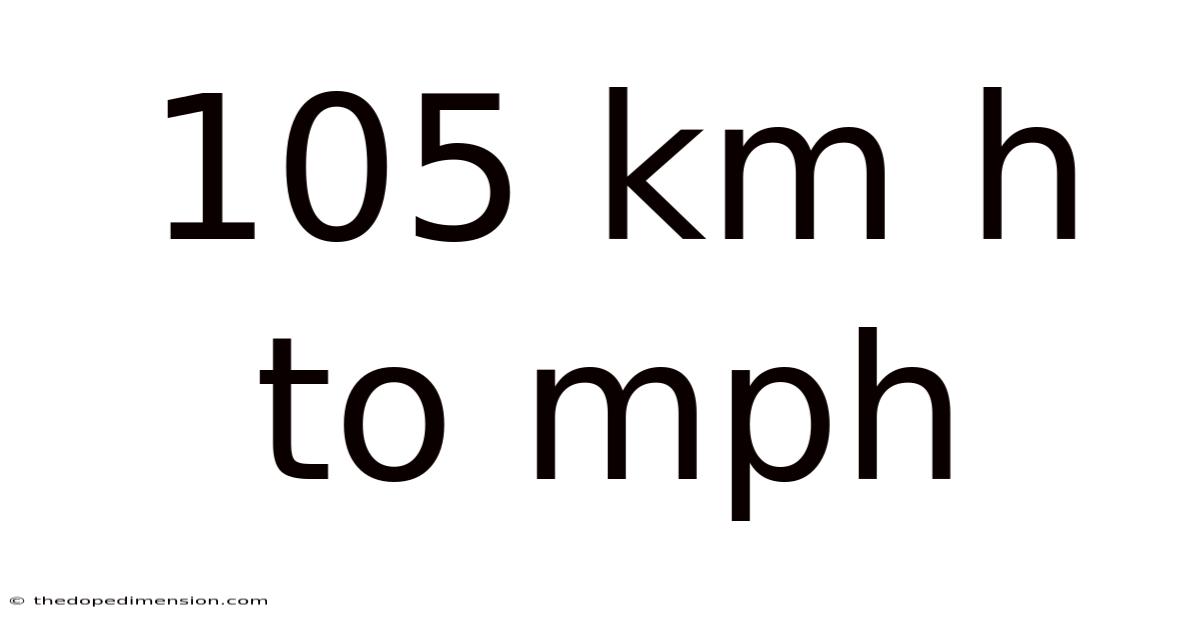105 Km H To Mph
thedopedimension
Sep 22, 2025 · 5 min read

Table of Contents
Converting 105 km/h to mph: A Comprehensive Guide
Are you struggling to understand the conversion between kilometers per hour (km/h) and miles per hour (mph)? This comprehensive guide will not only show you how to convert 105 km/h to mph, but also explain the underlying principles, provide multiple methods for conversion, and address frequently asked questions. Understanding speed conversions is crucial in various contexts, from everyday driving to scientific calculations and international travel. This guide aims to demystify this seemingly simple yet important conversion.
Understanding the Units: km/h and mph
Before diving into the conversion, let's understand the units involved. Kilometers per hour (km/h) is a metric unit of speed, measuring the distance traveled in kilometers within one hour. Miles per hour (mph), on the other hand, is an imperial unit, measuring the distance in miles within one hour. The difference in units stems from different systems of measurement: the metric system (primarily used globally) and the imperial system (predominantly used in the United States).
Method 1: Using the Conversion Factor
The most straightforward method involves using a conversion factor. One kilometer is approximately equal to 0.621371 miles. Therefore, to convert 105 km/h to mph, we multiply the speed in km/h by this conversion factor:
105 km/h * 0.621371 miles/km ≈ 65.23 mph
This calculation gives us an approximate value of 65.23 mph. The slight rounding is due to the approximation in the conversion factor. For most practical purposes, this level of accuracy is sufficient.
Method 2: Step-by-Step Conversion
This method breaks down the conversion into smaller, more manageable steps. It provides a deeper understanding of the process:
-
Identify the conversion factor: As established, 1 km ≈ 0.621371 miles.
-
Set up the equation: We want to convert 105 km/h to mph. We can set up the equation as follows:
105 km/h * (0.621371 miles/1 km)
-
Cancel out the units: Notice that the "km" units cancel each other out, leaving us with miles/hour.
-
Perform the calculation: 105 * 0.621371 ≈ 65.23 mph
This method reinforces the concept of unit cancellation, a crucial aspect of dimensional analysis in physics and engineering.
Method 3: Using Online Converters
Numerous online converters are available that instantly convert between km/h and mph. Simply input the value in km/h (105 in this case), select the desired conversion, and the converter will provide the equivalent speed in mph. While convenient, understanding the underlying principles (as explained in methods 1 and 2) is crucial for developing a strong grasp of unit conversion.
The Significance of Accurate Conversion
Accurate speed conversion is critical in various situations:
-
International Travel: Understanding speed limits and adhering to them is essential when driving in countries using different unit systems.
-
Navigation and Mapping: GPS systems often display speeds in either km/h or mph, depending on regional settings. Accurate conversion ensures proper interpretation.
-
Scientific Research and Engineering: Accurate unit conversion is fundamental in various scientific and engineering calculations involving speed and velocity.
-
Aviation: Air traffic control and flight planning require precise conversions to ensure safety and efficiency.
-
Sports: In sports like motor racing and cycling, accurate speed measurement and conversion are critical for performance analysis and record-keeping.
Beyond the Conversion: Understanding Speed, Velocity, and Acceleration
While this article focuses on converting 105 km/h to mph, it's important to understand the broader context of speed, velocity, and acceleration.
-
Speed: A scalar quantity representing the rate at which an object covers distance. It only has magnitude (e.g., 65.23 mph).
-
Velocity: A vector quantity representing the rate at which an object changes its position. It has both magnitude and direction (e.g., 65.23 mph North).
-
Acceleration: The rate at which an object's velocity changes over time. It can involve changes in speed, direction, or both.
Frequently Asked Questions (FAQs)
Q1: Is the conversion factor always exactly 0.621371?
A1: No, it's an approximation. The exact conversion factor is slightly more complex, but 0.621371 provides sufficient accuracy for most practical purposes.
Q2: Can I convert mph to km/h using the same method?
A2: Yes, simply use the inverse of the conversion factor (1 mile ≈ 1.60934 km). To convert from mph to km/h, multiply the speed in mph by 1.60934.
Q3: Why are there two different systems of measurement for speed?
A3: Historically, different systems of measurement evolved independently in different parts of the world. The metric system, based on powers of 10, is now the globally preferred system, but the imperial system remains in use in some countries.
Q4: Are there any other units for measuring speed?
A4: Yes, other units include meters per second (m/s), feet per second (ft/s), knots (nautical miles per hour), and Mach (speed of sound).
Conclusion
Converting 105 km/h to mph is a straightforward process, best understood through the application of conversion factors and a clear understanding of units. This guide has provided multiple methods for achieving this conversion, highlighting the importance of accurate conversions in various real-world applications. Beyond the simple numerical conversion, understanding the broader concepts of speed, velocity, and acceleration enhances our grasp of physics and its applications. Remember to always double-check your conversions, especially in critical situations where accuracy is paramount. Mastering unit conversions is a crucial skill across numerous disciplines, and this guide serves as a solid foundation for further exploration.
Latest Posts
Latest Posts
-
25 Mb How Many Kb
Sep 22, 2025
-
1 Troy Ounce To G
Sep 22, 2025
-
Kw To Amp Conversion Formula
Sep 22, 2025
-
How Far Is 500 M
Sep 22, 2025
-
1 Gallon Benzina V Litry
Sep 22, 2025
Related Post
Thank you for visiting our website which covers about 105 Km H To Mph . We hope the information provided has been useful to you. Feel free to contact us if you have any questions or need further assistance. See you next time and don't miss to bookmark.